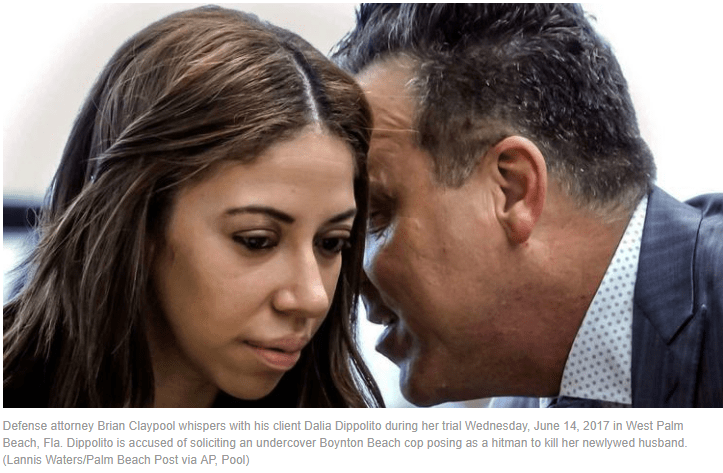By: Marc Freeman – Contact Reporter – Sun Sentinel
An expert in best practices for cops criticized the Boynton Beach Police Department on Wednesday during Dalia Dippolito’s retrial on a 2009 murder-for-hire charge.
But Timothy Williams, a retired Los Angeles Police Department detective hired by Dippolito’s lawyers, also was under fire
when prosecutors challenged his knowledge and conclusions about the case of the woman accused of planning the death of her husband.
Williams testified for about four hours, more than twice as long as his paid appearance on behalf of Dippolito at her second trial in December that resulted in a hung jury.
The difference this time was a fiery and lengthy cross examination by Assistant State Attorney Craig Williams — no relation — concerning recordings of Dippolito’s conversations with a police informant and an undercover cop posing as a hit man.
At one point, Timothy Williams said Dippolito never gave any money for the alleged murder. But the prosecutor then showed $1,200 in evidence, cash that Dippolito allegedly handed the informant for the fake hit man to use to buy a gun and cell phones.
Craig Williams also reminded the expert that money doesn’t even have to be exchanged for someone to be convicted of solicitation to commit first-degree murder with a firearm.
The prosecutor also asked the defense expert if Dippolito was “wishy washy” when she told undercover officer Widy Jean on one recording: “I’m positive, like 5,000 percent sure I want it done.”
Timothy Williams replied, “It was gamesmanship as far as I was concerned.”
When questioned by defense attorney Brian Claypool, Williams told the jury that Boynton Beach police mishandled the investigation of Dippolito from the moment her ex-lover, Mohamed Shihadeh contacted the cops with his concerns on July 31, 2009.
Rather than assess whether Dippolito was at risk of domestic abuse, the police rushed to turn Shihadeh into a confidential informant.
“Domestic violence is serious and they should have gone out to check if Ms. Dippolito was a victim,” Williams said.
He explained that the department botched the whole case by apparently forcing Shihadeh to work as an informant — under the alleged threat of arrest — against its own policy.
“In my opinion it taints the investigation,” Williams said.
“You’re taught in law enforcement you don’t coerce anyone … you don’t threaten anyone,” he testified. “It’s illegal … you don’t harass someone to get an end result.”
Shihadeh is scheduled to testify Thursday as a defense witness.
Williams also said the investigation was flawed because the police failed to record some phone calls and discussions between Dippolito and Shihadeh during his time as an informant. And he backed the defense’s theme that it was inappropriate for the department to invite the “Cops” reality TV program to film parts of the investigation.
But the prosecutor later challenged Williams’ review of the evidence, and the expert acknowledged he had not seen text messages between Dippolito and another man concerning plans to get her husband arrested on a parole violation.
Williams, whose nearly 30-year law enforcement career included work on robbery and homicide cases, told the jury he has been paid $325 an hour for his work on the Dippolito defense case, for a running total of $6,500.
Claypool quipped that the prosecutor “attacked the credibility” of a witness who has testified as an expert in 64 other criminal trials.
Also Wednesday, Circuit Judge Glenn Kelley ruled that Dippolito’s lawyers would not be allowed to call a witness described as an expert in facial recognition, body language, and human behavior.
“There is not a court in this state that would allow this testimony,” he said. “A jury is well capable to review a video and reach its own conclusions.”
The defense consultant, Susan Constantine-Perfido, previously has said Dippolito’s facial expressions on the undercover police video don’t show that she intended to have her husband killed.
Dippolito, 34, was found guilty at her first trial in 2011 and sentenced to 20 years in prison. But an appeals court tossed the conviction and punishment. She has been on house arrest for close to eight years.
